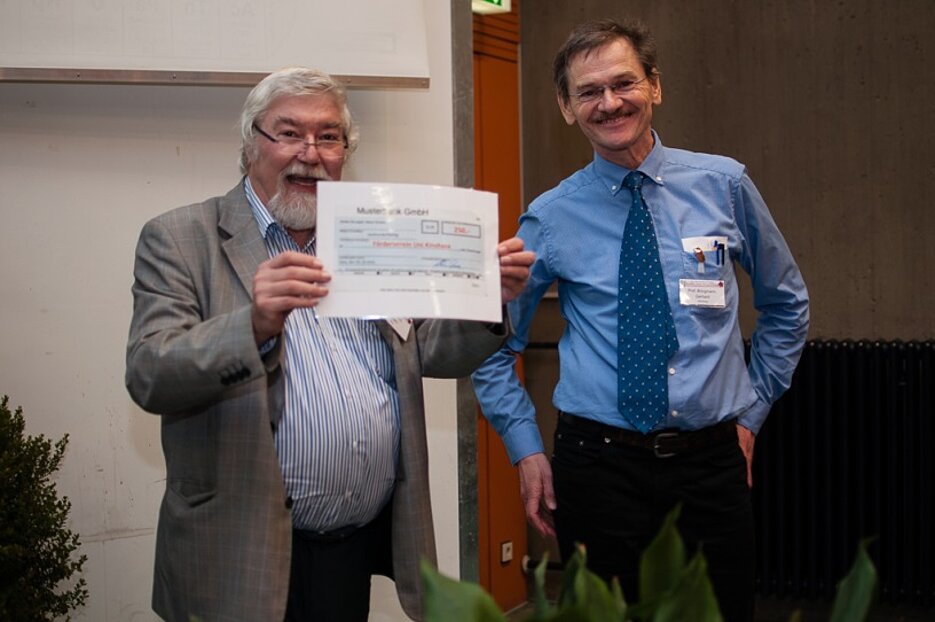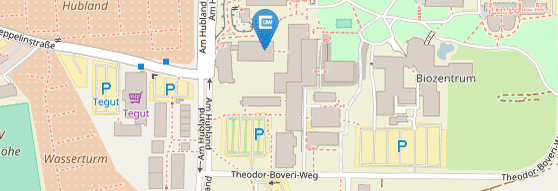Anniversary Meeting of Natural Products Scientists
10/12/2015More than 100 natural products scientists came together on October 9, 2015 for a one-day symposium entitled "Natural Products: Chemistry, Biology, and Ecology" – this time already for the 50th meeting. Host of the meeting was (like for the first conference) Prof. Gerhard Bringmann, Chair of Organic Chemistry at the University of Würzburg.

All began on June 3, 1991, at that time under the name of "Fränkisches Naturstofftreffen", with three universities from Northern Bavaria and the chair holders Prof. Gerhard Spiteller (Bayreuth), Jürgen Bestmann (Erlangen), and Gerhard Bringmann (Würzburg) as the founders. Since then these informative meetings of the participating institutions have been held twice per year, in uninterrupted order. They have become a valuable forum for the promotion of young scientists in this field.
Meanwhile also three research institutes have been included (the Leibniz Institute of Plant Biochemistry in Halle, the Max Planck Institute for Chemical Ecology, and the Hans Knöll Institute, both in Jena), and further universities (University of Leipzig, LMU München, ETH Zürich, and, temporarily, the Universities of Vienna and Bonn); they, in turn, take the responsibility for acting as the host – Würzburg now for the 13th time.
Opening Addresses of the Meeting
In his welcome address to the anniversary meeting in the central building of the Faculty of Chemistry at Hubland Campus of the University of Würzburg, G. Bringmann spoke about the development of the natural-products meetings and illustrated the different stages of this event – "an extraordinary success story", as he said.
The President of the University of Würzburg, Prof. A. Forchel, emphasized in his greeting that the University of Würzburg can look back on a long and successful tradition in natural products chemistry. He particularly referred to the brilliant pioneering work of Emil Fischer, one of the first Nobel laureates in chemistry. For this work the Institute of Organic Chemistry was honored with the "ACS Citation for Chemical Breakthrough Award 2015" only a few days ago.
But also nowadays Würzburg is again a center of natural products research and starting point of numerous interdisciplinary research networks like the SFB 630 "Agents against Infectious Diseases", which G. Bringmann has been coordinating during its complete duration of 12 years.
The President congratulated the organizers on this successful event and its great continuity and effectiveness. It does not only serve as a forum for scientific exchange but also as chance/springboard for the promotion of young natural products researchers. These scientists present their works on natural products to a broader public, some of them even for the first time. Numerous young scientists – so to speak "children of the natural-products meetings" – are meanwhile successful professors.
New Agents from Nature
Natural products chemistry is a highly interdisciplinary field of research in the heart of chemistry, with partners in pharmacy, biology, and medicine. Thus, it contributes to a modern education, comprising aspects of analytical, synthetic, pharmaceutical, and theoretical chemistry as well as molecular biology and ecology.
During the anniversary meeting exciting topics on natural products research were addressed, like the discovery of new bioactive agents from nature. The participants reported on cage-like bridged alkaloids from tropical lianas with interesting anti-infective properties, but also on agents from African species of St. John's wort acting against worm disorders
Investigation and Optimization of Agents
Besides the elucidation of molecular architectures, one major objective is always the synthetic production of such newly discovered substances in the lab – both as a proof of their structures, and in order to provide sufficient quantities of the compounds for tests of their biological properties. These substances may then be further optimized by synthetic variation of the molecule, possibly leading to a pharmaceutically usable agent.
Within this range of topics, new methods of organic synthesis were presented during the meeting, such as the modular preparation of new glycanes. These are molecules of recognition on the surface of cells consisting mostly of carbohydrates. As the talks illustrated, enzymes are increasingly used as synthetic tools.
Of particular interest are the biological properties of natural products, not only for the benefit for humans, but also for gaining a more in-depth understanding of their tasks and functions in nature, e.g. in the "chemical communication" between living organisms.
News from the DNA
As a tradition, the final lecture was held by a highly renowned visiting scientist, this time Prof. Thomas Carell from the Ludwig-Maximilian University of Munich. His talk dealt with new developments in the field of molecular genetics, with the title "DNA Bases beyond Watson and Crick". These two scientists received the Nobel Prize for structural elucidation of the DNA in 1962. And exactly for this field of research the Nobel Prize for Chemistry has been awarded four days ago, this time for the elucidation of the DNA repair mechanisms.
With a "convivial get-together with snacks" the meeting ended providing numerous further possibilities for fruitful scientific conversations. "The next meeting, the 51th one, will take place on April 8 next year, then in Bayreuth. In October 2016 it will be the turn of Halle", said Bringmann.
Download of this press release (pdf) (with additional photos)


